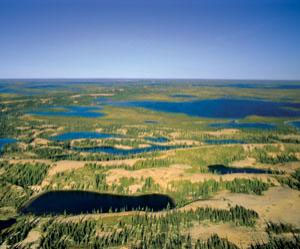Arctic lake mysteriously missing
The earth warms and the ice is melting, but contrary to the speculation of scientists, the water levels in the Arctic lakes not only do not rise but also . lower. Some small lakes mysteriously disappeared.

According to satellite images in a survey of 1.3 million large and small lakes in Canada, scientists found that the lake area of the country lost 6700 km 2 , equivalent to 1.2% of the time from 2000 to 2009.
Whatever the cause, this shrinking lake phenomenon is also negatively impacting nature and people in this area.'This is an important finding. We need to solve this mystery , 'said Larry Hinzman, director of the International Arctic Research Center in Alaska on NewScientist.
10 years is a long enough time to signal the climate is changing. At the same time, things happen on a scale that is wide enough to affect the ecosystem as well as the climate of the region. Migratory birds, aquatic life, indigenous people who eat on the 'million lakes' area may face major challenges if the dry state continues.
In fact, it is not now recorded that the Arctic lakes dried up and disappeared. However, in the past, this situation was only common in the south pole of the Arctic, where the warming trend of the Earth caused the ice soil (Geologically, ice soil is soil with temperature 0 or below 0 within 2 years or so) Water melts and water is drained by dry soil.
However, the new University of Maryland study produced the opposite result: it was the lakes in the north that were narrowed and dried up, while the lakes in the South did not change.
This finding is quite surprising, because the average rainfall of the northern region is always higher than the south during the past 10 years. Moreover, most of the water in the lake is caused by the seasonal melting of icebergs. As expected, with the warmer weather, the area of the glacier will have to be reduced and the water level must rise. Another strange thing is that there is no evidence that ice in the north is melting so that lake water can be absorbed.
- Arctic ice lake caught fire mysteriously
- The lake is bubbling, burning in the Arctic
- A mysterious missing American spacecraft
- Detecting Cupid's lake
- Chile: a missing ice lake
- Dive to the bottom of the coldest lake in the winter
- The mystery of the plane cases suddenly went missing
- See the fanciful Earth through satellite images
- The Arctic was warm
- The truth about 'Bottomless Lake' in Serbia
- Russian military satellites are mysteriously missing
- Interesting facts about animals living in the Arctic
 Is the magnetic North Pole shift dangerous to humanity?
Is the magnetic North Pole shift dangerous to humanity? Washington legalizes the recycling of human bodies into fertilizer
Washington legalizes the recycling of human bodies into fertilizer Lightning stone - the mysterious guest
Lightning stone - the mysterious guest Stunned by the mysterious sunset, strange appearance
Stunned by the mysterious sunset, strange appearance